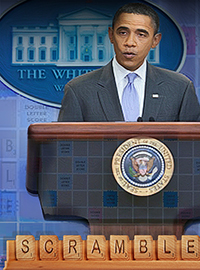| Obama Plays Word Games with Executive Power |
 |
|
By Ashton Ellis
Tuesday, December 23 2014 |
President Barack Obama and his allies like to say he’s issued far fewer executive orders than his predecessors, giving the false impression that his unilateral actions can be compared on the same terms. “The truth is, even with all the actions I’ve taken this year, I’m issuing executive orders at the lowest rate in more than 100 years,” Obama said in Texas last summer. “So it’s not clear how that Republicans didn’t seem to mind when President Bush took more executive actions than I did.” Around the same time, Senate Majority Leader Harry Reid (D-NV) couldn’t resist chastising Republicans for being hypocritical in a floor speech defending Obama’s penchant for unilateral executive action. “While Republicans accuse President Obama of executive overreach, they neglect the fact that he has issued far fewer executive orders than any two-term president in the last 50 years.” Jay Carney, then acting as Obama’s press secretary, made a similar point. “There is no question that this president has been judicious in his use of executive action, executive orders, and I think those numbers thus far have come in below what President George W. Bush and President Bill Clinton did.” All of those statements are designed to make it look like Obama’s use of unilateral executive action is nothing new, and in fact, far less numerous than his predecessors. They feed the narrative of a president mindful of his limitations who acts well within predetermined boundaries. But a closer look at the evidence shows that all of those characterizations are just an elaborate word game to obscure what Obama is really doing. What Obama, Reid and Carney don’t say is that for the first time in history the president uses more presidential memoranda than executive orders to achieve his policy goals. As of last Tuesday, Obama has issued 195 executive orders, and 198 presidential memoranda, according to an analysis by USA Today. This translates into “33 percent more presidential memoranda in less than six years than Bush did in eight,” reports the paper. That’s also 45 percent more than Bill Clinton. Far from signaling restraint, this shift indicates a deliberate strategy to expand the scope of the president’s power by concealing it through little-known directives. From a legal standpoint, there’s no difference between an executive order and a presidential memorandum. “[T]here is no substantive difference in the legal effectiveness of an executive order and a presidential directive that is not styled as an executive order,” says an opinion by the Office of Legal Counsel in the Department of Justice. It goes on to state, “We are of the opinion of no basis for drawing a distinction as to the legal effectiveness of a presidential action based on the form of the written document through which that action is conveyed.” Both types of documents direct executive bureaucracies to prioritize – or implement – presidential policies. Though each has been used at least since the Truman administration, Obama’s heavier reliance on presidential memoranda signals an ominous shift away from political accountability. Unlike executive orders, memoranda are not numbered, not indexed and not comprehensively published in the Federal Register where they can be accessed by members of the public. They can also be controversial. After the Sandy Hook shooting when Obama was unable to get gun control legislation through Congress, he turned to a series of presidential memoranda to impose some of the same restrictions on his own. One particularly questionable tactic was expanding the information available to the federal background check database – a potential invasion of privacy that Congress did not authorize. More recently, Obama used a memorandum – also called a presidential directive – to instruct immigration agencies to halt deportations against an entire class of illegal aliens. This move, which applies to as many as five million people, is perhaps the most expansive use of presidential power in the domestic sphere. And yet, because it did not occur through an executive order, Obama doesn’t count it or the 197 other memoranda when framing his record on executive action. Inside the Obama administration it’s clear that under the category of “executive action” fall both executive orders and presidential memoranda. Saying otherwise is a brazen act of deliberate deception. |
Related Articles : |
























